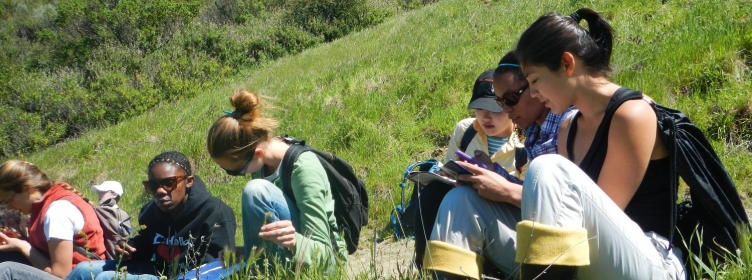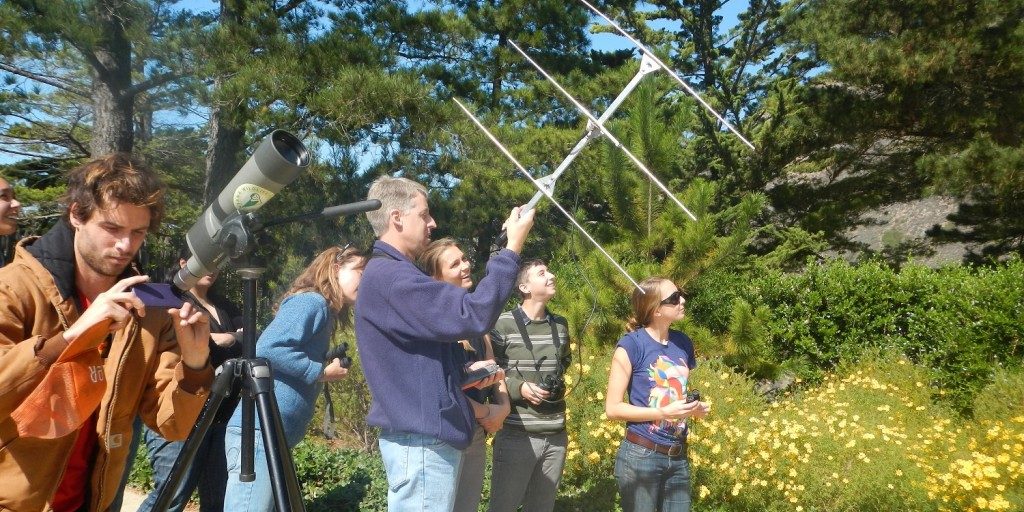Mills College and our research lab are featured in a Vanity Fair article (May, 2016) on the continuing value and relevance of women's colleges.

Students in Plant Ecology (Bio 155) keying out the rare Amsinckia lunaris at Las Trampas Regional Wilderness.
Teaching philosophy
I am a teacher-scholar, dedicated to the craft of teaching, the pursuit of research, and the integration of the two. High quality teaching includes not only conveying the content of our discipline but also giving students the opportunity to practice the ways in which scientists explore the natural world: identifying problems and unanswered questions, independently evaluating evidence, and assessing competing interpretations. Conducting science should also engage one's curiosity and excitement. As Zora Neale Hurston said, "research is formalized curiosity. It is poking and prying with a purpose." Students engaged in research outside of the classroom have many opportunities for this sort exploration. But most students are not part of a research team so I bring this experience into the classroom with the use of CUREs. I use our class meetings as opportunities to not only share our collective understanding of how the natural world works, but also practice the skills of our discipline and to spark the excitement that comes from "poking and prying with purpose."
Current courses
General Biology (Bio 002): Principles of biological science underlying the structure and function of living things. The origins and diversity of life. An evolutionary survey of viruses, bacteria, fungi, plants, and animals using comparative anatomy, morphology, physiology, and development. Lecture, laboratory and discussion section.
Plant Ecology for Non-majors (Bio 055). This classes uses a modular format to highlight fascinating aspects of plant ecology such as co-evolution between plants and their pollinators, and the role of diversity in ecological stability. We emphasize science as a process of exploration that deepens our understanding of the natural world rather than a set of facts to be memorized. Lecture, discussion and experiments.
Evolution (Bio 148): This course covers major concepts of evolutionary biology including population genetics, speciation, the origin of adaptations, the history of life, phylogenetic analysis, and the historical background of evolutionary theory.
Plant Ecology (Bio 155): An exploration of the ecology of plant form, function, distribution and diversity from individuals to populations, communities and ecosystems. Topics include ecological genetics, local adaptation; life history strategies; population biology; interspecific interactions (competition, facilitation, pollination, herbivory, seed predation, diseases); disturbance and succession. Lecture with lab (greenhouse and field experiments; taxonomy, use of dichotomous key, discussion of peer-reviewed literature; field trips).
Conservation Biology (Bio 149): Quantitative treatment of the central concepts in ecology as applied to complex, real-world conservation problems. Topics include stochastic and deterministic processes of extinction; demographic modeling and population viability analyses of small, isolated and/or declining populations; conservation genetics; community-level causes and consequences of the decline/extinction of single species; the design of effective conservation plans using quantitative approaches. Lecture with lab (population viability analyses; discussions of peer-reviewed literature; field trips).
Community and Ecosystem Ecology (Bio 145): Community Ecology is the study of interactions between species and how they are influenced by the abiotic environment to determine dynamic patterns of distribution and abundance. Ecosystem Ecology is the study of the flow of energy and matter through ecological communities across multiple spatial scales. Topics include the creation and function of biodiversity, food webs, the role of disturbance in ecosystem processes, factors controlling ecosystem productivity, nutrient cycling, and the flow of energy through the living and non-living components of ecosystems.
Tropical Ecology & Conservation: Ecuador (Bio 147): We travel to the cloud forests of Ecuador to explore the ecology of the most diverse country in the world. We live and work with with members of a community-based conservation consortium on thee western slope of the Andes. Topics include tropical ecology, reserve design, and the economics and ethics of conservation. This immersive course is a combination of experiential learning in the field, discussion, and service work. (See our blog!)
Senior Seminar (Bio 191): Designed to help senior major students attain proficiency in scientific analysis, writing, and oral presentation. Guides preparation of the senior thesis. Students will conduct a literature-based thesis or, with permission of a faculty mentor, a thesis based on original research.
